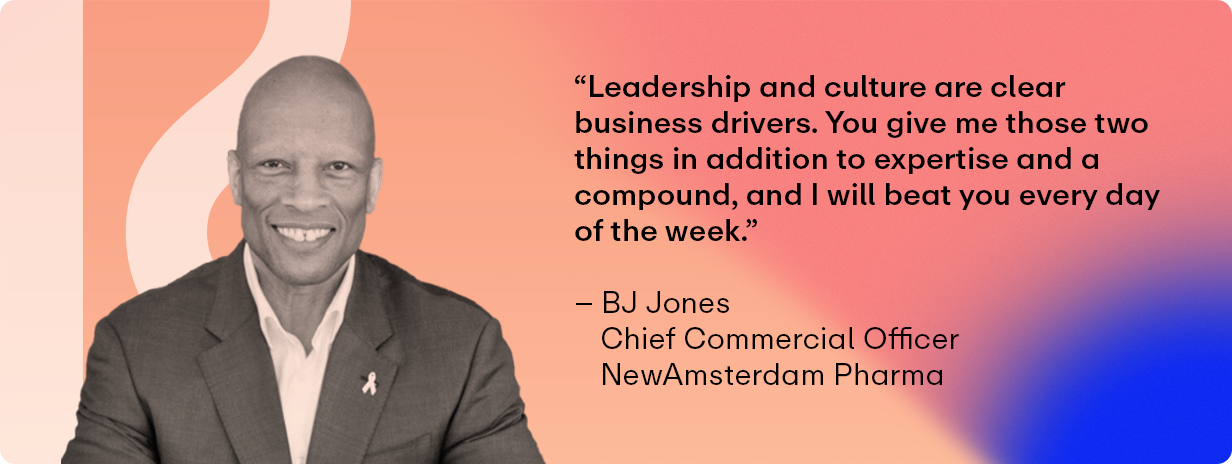When BJ Jones graduated from the United States Air Force Academy, it was with a singular mission in mind: He and his fellow newly minted second lieutenants were expected to lead. Even if Jones hadn’t spent four years in the Academy’s vaunted Leadership Laboratory, it was understood that, as he puts it, “My job from that day going forward was to help people achieve more together than they ever could by themselves. My job was to be a leader of men and women.”
It’s a responsibility that Jones has embraced ever since, first at the Academy and then over the course of a three-decade career in life sciences. In his mind, leadership is a true differentiator – and often the missing ingredient when a company or product falls short of its potential.
“I think it’s overlooked,” Jones, now chief commercial officer at NewAmsterdam Pharma, explains. “Some organizations will bring in a bunch of high performers and assume that they’ll just figure it out. In my experience, they almost never do.”
That’s why, at every stop on his professional journey, Jones has devoted considerable attention to meticulously structuring commercial and operational teams and then aligning their members around clearly stated objectives. “The goal has always been to surround myself with people who are far better at their jobs than I can ever be. I bring them together and get out of the way,” he says.
Jones doesn’t do this for the sake of internal harmony alone, however. He does it because it’s good for the bottom line.
“Leadership and culture are clear business drivers,” Jones stresses. “You give me those two things in addition to expertise and a compound, and I will beat you every day of the week.”
This approach has resonated across commercial, sales and operational roles, across therapeutic areas and across geographies. But while it has contributed to any number of commercial successes – Jones played a pivotal part in the launches of blockbusters like AstraZeneca’s Farxiga, Boehringer Ingelheim’s Pradaxa and Biohaven’s Nurtec, among others – it wouldn’t work without Jones’ personal warmth and ability to rally close-knit teams behind him. Leaders need followers and believers; colleagues speak of Jones less as they would a boss than a family member.
“The culture he builds keeps everyone connected and sets people up for success,” says NewAmsterdam Pharma EVP, enterprise operations Chris Deluzio. “That’s what they want and need in a leader.”
Deluzio knows this from personal experience: He first encountered Jones 25 years ago at BMS and the two have worked together in multiple capacities and at multiple companies since then. “BJ goes somewhere and I follow,” he adds with a laugh. NewAmsterdam program manager Joan Shollenberger, who has worked with Jones for more than a decade, agrees: “People follow him because they trust him.”
The irony of Jones’ long run in life sciences is this: Until he was well into his 20s, Jones had little knowledge of, or particular interest in, the healthcare business. He recalls writing school reports on airplanes and fighter jets, captivated by stories of aerial heroics during World War II. Those aspirations set him on a natural path to the Air Force Academy. While Jones later added a master’s degree in industrial engineering from Texas A&M University and a Master of Business Administration degree from Stanford University’s Graduate School of Business, the leadership lessons imparted at the Academy loom large in his life sciences origin story.
Loads of commercial executives have leadership responsibilities thrust upon them as they ascend the corporate ladder. Jones’ leadership skills, on the other hand, pre-date his arrival to the business world – and he would put them to work sooner than expected.
Bristol Myers Squibb recruited him out of the Academy, dangling one of the five slots in an exclusive management-training program. Jones had little in-depth knowledge about pharmaceuticals or healthcare, but he was intrigued enough to take the call. Ultimately it came down to a career in the military or the BMS opportunity.
“I made the right choice,” Jones says succinctly.
The BMS program consisted of two years worth of rotational assignments, including a stint at the Zimmer devices unit (which was spun off into a separate entity in 2001). Jones discovered quickly that life science company incentives were very much aligned with his own.
“I saw firsthand how people were suffering. The breadth of health conditions without any treatments or solutions kind of staggered me,” he recalls. “Changing that – coming up with products in certain disease states and sustaining and improving so many lives – was in line with the way I work and think and feel.”
Jones spent more than a decade at BMS before following one of his mentors to NitroMed. This marked his first experience leading a marketing and business development function, and at a fledgling enterprise to boot.
“I got the startup fever,” he says. “I was able to spread my wings more broadly in a smaller organization. Being part of every decision that was made – I loved that.”
After three years at NitroMed, Jones spent the next 12 years in a range of commercial and operational leadership roles at large pharma companies. Toward the end of the decade, he was introduced to Biohaven chairman and CEO Dr. Vlad Coric. The two started what Jones calls “a long dating conversation” about the asset that would eventually become Nurtec, and the company’s ambitious plans for it. The only thing missing was a person to lead the charge.
Jones (and Deluzio and Shollenberger) arrived at Biohaven in mid-2019, spending the next eight months in frantic preparations for a planned early-2020 launch. The Food and Drug Administration approved Nurtec on February 27 for the treatment of migraine in adults. And then, just as the drug was making its way to market, Covid-19 shut down the world.
Given that AbbVie had launched its own migraine drug, Ubrelvy, three months earlier, Biohaven found itself at a competitive disadvantage. So how did Nurtec ultimately win the battle for market share?
To hear Jones tell it, Biohaven’s size worked in its favor. “We were small and nimble, which allowed us to have a first-mover advantage in the tactics we used,” Jones says. He believes the Nurtec launch was the first that tapped into the burgeoning marketing might of TikTok, for example.
Jones remained at Biohaven until a few months after its $11.6 billion sale to Pfizer closed in October 2022. After helping address unmet need in migraines with Nurtec, Jones now hopes to do the same for cardiovascular disease at NewAmsterdam. The company announced positive results last December in the third of its phase 3 trials for obicetrapib, designed to treat elevated levels of low-density lipoprotein cholesterol (LDL-C).
Even as pharma has attacked its underlying causes from multiple angles, cardiovascular disease remains the leading cause of death around the world. When combined with Jones’ respect for NewAmsterdam CEO Dr. Michael Davidson (“he’s on the Mount Rushmore of cardiovascular treatment”) and the company’s strong financial footing, it’s easy to see why the opportunity appealed to him.
“It’s the type of organization I want to be a part of,” Jones says. “We focus on culture and the operating principles of coming together. It’s not just high-performing people doing their own thing.”
Asked where he sees himself in five years, Jones responds that he’s energized by his work on “obi” and confident about its chances of helping myriad people in need. He considers himself extremely fortunate to have found his way to NewAmsterdam at this point in his career.
“I can say with great confidence I’ve never been bored in any job I’ve had,” Jones continues. “I loved what I did in the military, but I was recruited into something that seemed even more exciting. That’s been true of every scenario… I’ve never once raised my hand and said, ‘I want to leave.’”
Should Jones ever decide to switch gears, his colleagues believe his leadership approach would readily translate to any number of pursuits. Deluzio believes he would make a fine life or executive coach. “BJ does it innately,” he notes. Shollenberger says she has tried to convince him to run for government office.
Jones himself hasn’t sketched out plans for his personal and professional futures. He’s a father to four children in their 20s and sits on the board of directors for Apogee Therapeutics and Annexon Biosciences as well as for the LUNGevity Foundation and the Air Force Academy Foundation. He says that the volunteer work in particular “feeds [his] soul.”
Retirement, if and when it arrives, will almost certainly involve more engagement of this nature. Beyond that, Jones isn’t sweating the details.
“I don’t see myself buying a big yacht and sailing the Caribbean,” he says. “Engaging on a meaningful basis with family and friends – that’s nirvana to me.”
Have you worked with a life sciences leader whose personal and professional story would make for an interesting Kinara profile? Drop us a note at hello@kinara.co, join the conversation on X (@KinaraBio) and subscribe on the website to receive Kinara content.




